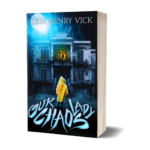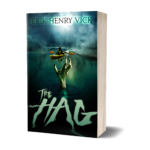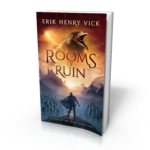Stephen King hates that question, I think. He writes about it in a lot of books and mentions it often in author’s notes, etc. I think every writer dreads this question because the answer sounds too pat, too off the cuff. It’s still true of every author I know or have spoken to about this.
Good ideas come from working. Yeah, sure, the original idea might come just pop into my head, or be inspired by something I’ve read or watched, but with very few exceptions, none of them are just ready to go. They need to be nurtured, loved, caressed. Okay, okay, sometimes they need to be beaten, but that’s legal in most states.
In the rare cases, like in the case of my novella, The Devil, (which you can read in Devils!), the ideas come so fast that it’s like a race to keep up with them. The original idea was about starting each section of the story with a line similar to the first line of the story: I’ve seen the devil, and she was beautiful. I thought about that for a couple of days and developed a list of 8 or 10 phrases like it. From there, the story took over. I wrote the first draft in less than a week, and in a very nonlinear fashion.
When I was professoring (tm), I usually pushed for a class on creative thinking in whatever program I was teaching in. Many people think it’s a talent, and I guess to some degree it is, but at its root, creative thinking is a skill. Like any skill, it can be developed. It takes practice, and there a multitude of exercises, methods, theories, and practices to explore (I will talk about some of these in later posts).
The task of turning an idea into a sound story idea revolves around something I call follow-up. Yeah, it’s not a very creative name, I get that. It’s also not very revolutionary. I get an idea and then I think about it for a short time — 20 or 30 minutes — to see if I want to play with it more, or put it in my ideas book (it’s really a One Note file) for more cook time. If I’m want to play it with a bit more, I let it go for a few hours and do something else — read, write, drink, take pain meds, whatever. Then I follow-up. I take the idea out and play with it some more. Sometimes, I begin writing scenes in my head or start some dialogue between characters. Other times I try to imagine what Stephen King (or Elmore Leonard, Dashiell Hammet, Michael Smith, Orson Scott Card, Larry Niven, Issac Asimov, Peter Straub, Anne Rice, etc., anyone really, really good) might do with the idea. It helps sometimes to give the idea to a writer from a different genre. The idea is to get to work. Set my mind thinking about developing the idea.
I don’t worry about things like a plot outline or character sketches or anything like that. Yes, I have done that in the past, but I’ve found that I work best when I get the hell out of the story’s way. Plus, it’s more fun. Although it makes answering the next dreaded question (what’s your story about) harder. My next novel, Errant Gods, started with the idea of writing about some of my experiences being disabled by RA. The first draft ended up being something like 240,000 words (950ish 8.5×11 doubles spaced sheets). It grew from being a straight horror mystery into something far more. I cut about 300 pages in rewrites, because the idea had grown much over the course of the writing.
What I mean about developing the idea is to see what directions I can grow it. I intentionally try to get the idea stuck on something. For example, in Errant Gods, the first think I wrote was a scene about a disabled investigator discovering one of his neighbors was a practicing serial killer while he was under the influence of pain medication and then forgetting it in the morning. Three months later, he discovered the information again and began to act on it, disabled or not. The more I thought about that though, the more stuck the idea became. He didn’t do things believably (to my mind) — he did things a cop wouldn’t do, or I couldn’t justify making a cop a do. So, I did some follow-up (and that scene was one of the first I cut). The story grew and grew and morphed and demanded I change things. What it is now is a far cry from what I thought it would be. Some of the elements are the same, but the book is much, much better.
I think that’s where the problem of answering “where do your ideas come from” originates. The first thing I think of when someone asks me that is: “Which ones?” The second thing I think of is: “The flopped around in my head until I had to let them out.” Neither of those are good answers. The good answer is: “I worked for them.”








